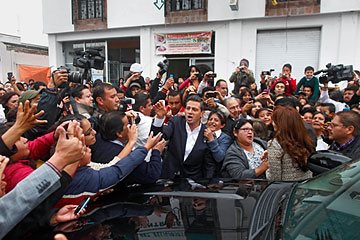
Pena Nieto is mobbed by supporters after casting his vote during the presidential election in July
(2 of 3)
Pressing the Flesh
For "Quique" Peña Nieto, the PRI is DNA. He was born in heavily populated Mexico state, adjoining Mexico City, in the town of Atlacomulco — which is also the name and cradle of a powerful PRI group with which his middle-class family had deep ties. His father was an electrical engineer and his mother a schoolteacher, but politics was as much a part of his childhood as soccer. Growing up, Peña Nieto had a ringside seat to his country's despotic vote-buying machine. That regime had started out decades before as the standard bearer of the Mexican Revolution's democratic values. But it degenerated, as the late Mexican literary giant Carlos Fuentes saw it in his epic 1962 novel The Death of Artemio Cruz, into a cynical syndicate, each generation of "new masters equally ambitious and rapacious." By the 1990s, Mexico had one of the world's highest numbers of billionaires even as its workers earned some of the world's lowest average wages.
But Peña Nieto, a lawyer by training, also absorbed the more positive qualities of Atlacomulco politics, among them administrative acumen and a willingness to listen to grassroots voices for hours on end. "I genuinely enjoy being out among people," says Peña Nieto, whose well-coiffed, telegenic looks and glamorous wife — telenovela (soap opera) star Angélica Rivera — have boosted his celebrity aura. "I'm not a politician who reads the public from a distance; you can't take [its] temperature that way." Says former Health Secretary and PRI president José Antonio González, a Peña Nieto mentor: "It's in Peña Nieto's political blood to be a dialoguista, to convince rather than impose."
Those attributes would come in handy when the PRI was finally defeated in 2000 by the conservative National Action Party, which has held Mexico's presidency for the past 12 years. Two-thirds of Mexico's 18-to-34 age bracket voted against the PRI candidate in 2000, and the then 33-year-old Peña Nieto knew that his party had to learn how to actually win elections, not rig them. As Mexico state governor from 2005 to 2011, he coaxed an opposition-led legislature to enact laws making the state's revenue collection more efficient and equitable while sharply trimming bureaucratic fat. Peña Nieto's tenure "was a reminder that the PRI does have accumulated experience in governing," says Federico Estévez, a political analyst at the Autonomous Technological Institute of Mexico in Mexico City. "The trick for Peña is proving that it can also govern responsibly."
Ending the Narco Nightmare
The tougher trick will be fulfilling the pledge Peña Nieto made during his presidential campaign to halve the number of drug-related murders in Mexico — which averaged more than 10,000 a year during the sexenio of his predecessor, Felipe Calderón, who sent the Mexican military after the cartels — by the end of his own presidency in 2018. (Peña Nieto claimed to have cut homicides by half in Mexico state until journalists found that his security officials had cooked the math; the murder rate actually remained unchanged, and Peña Nieto later admitted as much.) "Peña Nieto's mandate is security," says García. "More than anything, Mexicans voted for him to bring peace back."
Some U.S. officials worry that means the Peña Nieto — led PRI will go soft on drug interdiction, as the party was accused of doing in the 20th century. Peña Nieto strongly denies any "PRI pact" with drug lords, but the uncomfortable fact for Washington is that even if there were a deal, many Mexicans wouldn't mind it as long as the violence eased. To them, the routine massacres and beheadings are an unfair price they are forced to pay for America's reckless drug consumption and weak gun laws. "When the Vietnam body count got to 50,000, the U.S. got out of Indochina, and that's where Mexico is now," says a former high-ranking official in the Calderón administration.
That should make it easier for Peña Nieto to phase the army out of the drug war. But even if Calderón's bold but ill-conceived military strategy did often backfire, the uncomfortable fact for Peña Nieto is that his predecessor had to send out the troops because he couldn't rely on Mexico's corrupt and incompetent police forces to do the job. It's not the gringos' fault that Mexico's law-enforcement and justice systems are a benighted travesty — only 2% of violent crimes there ever result in convictions. Peña Nieto needs to push police and judicial modernization more seriously than the country's negligent elite has ever been willing to allow. "Mexico needs a more integrated approach to combating narco violence," he concedes. "It needs a much more coordinated and professional judicial power, especially [one] that makes more effective use of criminal intelligence."
Peña Nieto's answers to those difficult demands are still evolving. But Mexico's embarrassing spate of federal police scandals has at least allowed him to make law enforcement more centralized. He recently announced that the Cabinet-level Public Security Secretariat (SSP), which oversees los federales, would be put under the control of the Interior Ministry. Beyond that, Peña Nieto, like Calderón before him, wants more uniform training of all state-level cops. He also proposes a "national gendarmerie," a force of military-police officers, similar to Italy's carabinieri and Chile's carabineros, to replace the Mexican soldiers who were utterly unprepared to be drug cops.
